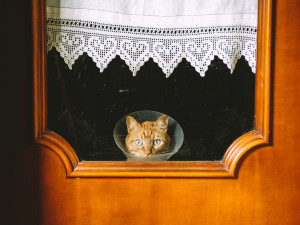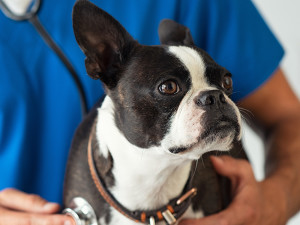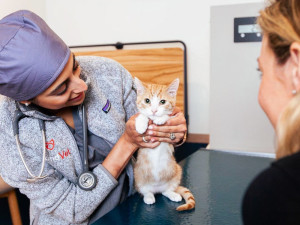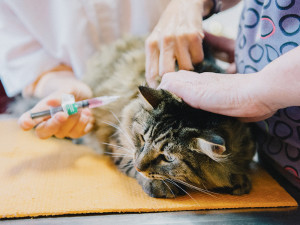How to Find a Vet Who Loves Your Cat Like You Do
I had to kiss a lot of frogs to find the perfect vet. Luckily, veterinarian Dr. Annette Louviere has some tips so you don’t have to, too.
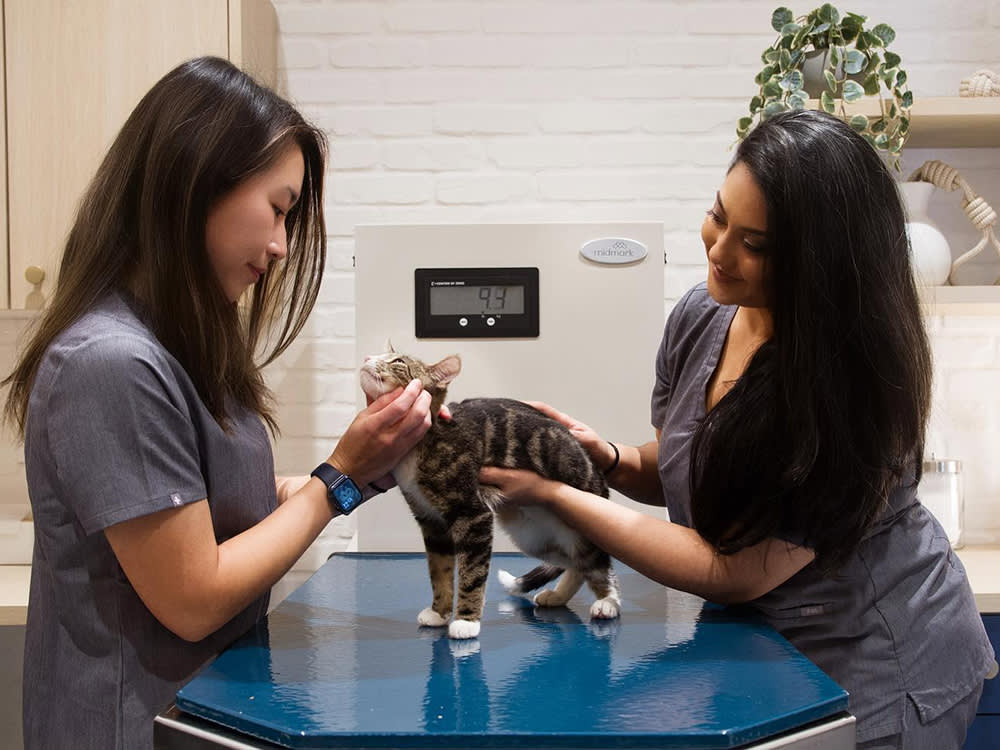
share article
I really like my vet, but finding her was tough. I had to kiss a lot of frogs, as it were, and burn through a lot of time and money first. You see, like many people, I adopted my cat, Pumpkinopens in a new tab, at the height of the pandemic, when I realized it was unlikely I would ever return to an office and decided it would be nice to have some company around the house. He was 14 at the time and recovering from extensive tumor surgery. He had lost all his teeth (unrelated) and when I picked him up, the rescuer informed me that he would suffer from chronic ear infections for the rest of his life. Oy!
He sure was (and is) cute, though. When we got home, I wrapped him in my arms like a teddy bear and we took a two-hour nap together. Swoon! The rescue sent me home with some drops and instructions for keeping his ears clean, but within a week, it became clear that I would need to find him a vet as soon as possible. I tried the fancy cat-only vet near me, but they were quite pricey and not easy to talk to.
The nonprofit vet in my area was much more affordable and they were very nice, but getting last-minute appointments (essential for an old cat with chronic health problems) was next to impossible. Plus, they didn’t always have the on-site facilities to properly assess and treat his issues, and would often have to refer me to the extremely expensive private hospital network in my area for follow-ups.
My current vet was recommended by a close friend who works for a cat rescue in Brooklyn and knew my specific needs and the details of my particular financial situation. The vet she recommended is an hour away by train, which is a hardship, but she is affordable, always makes time to see Pumpkin (despite having a very busy practice), and is a good communicator. They also do all their testing (at least the testing relevant to Pumpkin’s specific needs) on site, without forcing me to make a second appointment.
And yet, even now I can’t help but wonder if I’ve made the right choice. I mean, I love my cat and I want the best for him, and this vet seems great, but how do I know for sure? How does anyone? And if you don’t know where to start looking in the first place — what then? Well, I figured, if anyone would know how to find (and recognize) a good vet, it would probably be another vet. So, I reached out to Dr. Annette Louviere, a licensed veterinarian specializing in cats and an active member of the American Associate of Feline Practitioners, to talk through the vet search process.
First of all, what makes a good vet?
The most obvious answer is good observation skills and knowledge of medicine.
Which, as a layman, is really difficult for me to assess.
You can’t underestimate the importance of communication — with the pet parents, with their hospital team, and with the vet community as a whole. Open communication allows the veterinarian to build relationships and establish trust, which are key for providing high quality care.
Good communication. Got it. Should I worry about what school my vet went to? Are some veterinary schools better than others?
Veterinary colleges are rankedopens in a new tab, but, in the end, all veterinarians must pass a national licensing exam prior to their state exams in order to practice medicine. This means all accredited vet programs teach generally the same curriculum. That said, different veterinary schools offer different strengths within their programs. For example, vet students may opt for one school over another if particularly interested in certain areas like swine, poultry, or exotic medicine.
So how does one go about researching good vets?
Word of mouth is a very powerful tool, so it is worthwhile asking friends and family about their veterinary experiences. Similarly, if you are moving, you can ask your current veterinarian if they have colleagues or hospitals they would recommend in the new area.
What about online searches? Google feels overwhelming and ad-heavy, but is there some sort of trusted database I should be using instead?
To slim down the online search, two U.S. directories to consider are the American Animal Hospital Associationopens in a new tab (AAHA) and American Association of Feline Practitionersopens in a new tab (AAFP). Veterinary hospitals must pass a rigorous evaluation process in order to receive AAHA-accreditation, while AAFP offers a certification program for hospitals to be designated as cat-friendly practices.
What questions should I ask a potential vet? For instance, when I landed at my current vet, I asked about emergency services, appointment availability, costs (both for appointments and treatments) and whether they were able to test samples on site or had to send them out — which would take more time and probably cost more.
All of that is great! In-house diagnostic capabilities definitely vary between hospitals, as do available emergency services. It’s also important that the hospital’s regular office hours work with your schedule. Also, in my experience, it’s good to be on the same page about preventative careopens in a new tab, since this is (hopefully) the primary reason you’ll be visiting the vet. A preventative care discussion typically revolves around vaccine recommendationsopens in a new tab (which ones and on what schedule), types of parasite preventatives (heartwormopens in a new tab and flea/tick for outdoor catsopens in a new tab), nutrition optionsopens in a new tab, and so on.
What red flags I should look out for?
You, as the pet parent, should always feel included in the decision making. Remember that you are the best advocate for your furry friend, so you should feel comfortable asking questions and discussing next steps. It shouldn’t be a one-sided conversation. Also, while it may not be fun to discuss, finances are a part of life and need to be factored into treatment plan options.
Yeah, it’s so hard to talk about money, but I felt much better after I explained my financial situation to my current vet. What else should I look out for?
Just remember that medicine doesn’t have a cookie cutter, one-size-fits-all solution. Your pet is an individual with its own lifestyle and unique quirks and their care plans should reflect their personalized needs.
Most importantly, some doctors and pet parents just don’t mesh. And that’s okay! Your veterinarian is a key player in your pet’s care team and should be someone you can get along with. So, like any relationship, listen to your gut feeling if things aren’t sitting quite right.

Charles Manning
Charles Manning is an actor, writer, and fashion/media consultant living in New York City with his two cats, Pumpkin and Bear. Follow him on Instagram @charlesemanningopens in a new tab.
Related articles
![cat with cone after vet visit]() opens in a new tab
opens in a new tabDoctor’s Orders: Cat Vet Visits Are Essential
Get thy cat to a vet, even if it’s a struggle to get them out the door.
![A senior cat is held in their owner's lap]() opens in a new tab
opens in a new tabHow to Care for Your Senior Cat
From taking them to the vet more often to giving them a hand with grooming, older kitties need a little extra TLC.
![French bulldog being examined at the vet via stethoscope]() opens in a new tab
opens in a new tab9 Tips for Saving Money at the Vet
Ways to lower your bill — without compromising your pet’s health.
![Kitten sitting on a blanket]() opens in a new tab
opens in a new tab7 Steps to Keep Your New Kitten Happy and Healthy
With great cuteness comes great responsibility. A vet breaks down everything you need to know when you bring home a new kitten.
![A smiling veterinarian holding a cat]() opens in a new tab
opens in a new tabVets Are at High Risk For Compassion Fatigue—Here Are 4 Ways You Can Help
It’s extra important to be nice to the vet in your life.
![cat getting a vaccine at the vet]() opens in a new tab
opens in a new tabYep, Kittens Need Vaccines (Even Indoor Ones)
A vet gets the facts straight.
